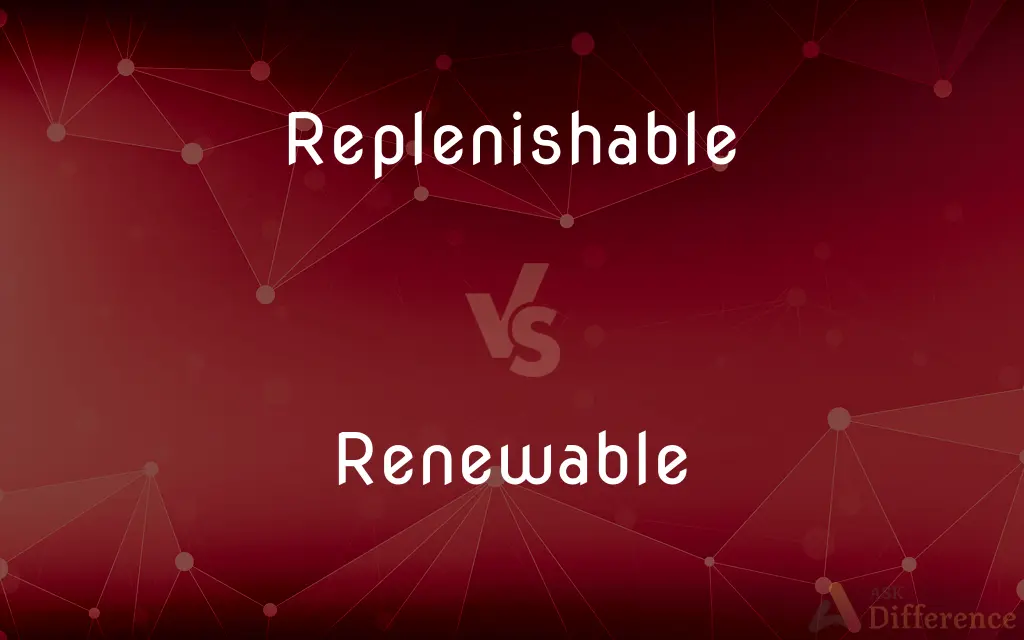Replenishable vs. Renewable — What's the Difference?
Edited by Tayyaba Rehman — By Fiza Rafique — Updated on April 17, 2024
Replenishable resources can be restored but may not be infinite, while renewable resources naturally replenish and are sustainable indefinitely.

Difference Between Replenishable and Renewable
Table of Contents
ADVERTISEMENT
Key Differences
Replenishable resources refer to supplies that can be replenished over time, typically through human intervention, whereas renewable resources are naturally replenished through ecological cycles and are sustainable indefinitely.
Replenishable items may include consumables like water in reservoirs, which can be refilled through rain or transfers, while renewable resources include wind or solar energy, which do not deplete with use.
The replenishment rate of replenishable resources can be variable and dependent on human management practices. On the other hand, renewable resources tend to have a more predictable and constant rate of replenishment driven by natural processes.
Economic implications vary between the two; replenishable resources often require significant investment to manage and sustain, whereas renewable resources typically have lower maintenance costs once the initial setup is complete.
Environmental impact is also a key differentiator; replenishable resources might still cause environmental strain if not managed sustainably, while renewable resources generally have minimal environmental impacts, promoting ecological balance.
ADVERTISEMENT
Comparison Chart
Source
Often man-made or managed
Naturally occurring
Sustainability
Potentially sustainable with proper management
Inherently sustainable
Dependency
Dependent on human intervention for replenishment
Self-replenishing through natural processes
Cost
May require more investment for management
Generally lower long-term costs
Environmental Impact
Can be high if not managed sustainably
Typically very low
Compare with Definitions
Replenishable
A resource that can be refilled or restored.
The aquifer is considered replenishable through careful water management.
Renewable
Requires initial investment but less intervention later.
Installing solar panels captures renewable solar energy with minimal upkeep.
Replenishable
Often involving human intervention to maintain supply.
Replenishable fuel sources require reforestation efforts.
Renewable
Endless supply as long as conditions are right.
Wind power is renewable, driven by natural climatic conditions.
Replenishable
Often associated with environmental management challenges.
Fish stocks are replenishable yet require careful quotas to prevent depletion.
Renewable
Promotes sustainable environmental practices.
Using renewable resources like biomass helps reduce ecological footprints.
Replenishable
Can vary in terms of restoration time and effort.
Soil fertility is a replenishable resource but requires years to restore.
Renewable
A resource that can replenish naturally without human aid.
Solar energy is renewable and available daily.
Replenishable
Not inherently endless; depends on usage and management.
Groundwater is replenishable but can be depleted if overused.
Renewable
Typically involves eco-friendly extraction methods.
Hydroelectric power is renewable and harnesses natural water flow.
Replenishable
Able to be renewed or replenished.
Renewable
Capable of being renewed
A renewable membership.
Renewable subscriptions.
Renewable
Relating to or being a commodity or resource, such as solar energy or firewood, that is inexhaustible or replaceable by new growth.
Renewable
Able to be renewed; capable of renewal.
Renewable
(of a resource) Sustainable; able to be regrown or renewed; having an ongoing or continuous source of supply; not finite.
Solar and wind power are renewable, but coal is not.
Renewable
A thing that is renewable; especially, a renewable source of energy.
Renewable
A renewable resource.
Renewable
Capable of being renewed; as, a lease renewable at pleasure.
Renewable
That can be renewed or extended;
A renewable lease
Renewable subscriptions
Renewable
Capable of being renewed; replaceable;
Renewable energy such as solar energy is theoretically inexhaustible
Common Curiosities
Are all renewable resources also replenishable?
While all renewable resources are inherently replenishable due to their natural cycles, not all replenishable resources are renewable, particularly if they require significant human intervention.
What is a replenishable resource?
A replenishable resource is one that can be restored or refilled, often with the help of human intervention.
How do replenishable and renewable resources impact the economy?
Replenishable resources often require ongoing management and investment, while renewable resources generally provide more stable and long-term economic benefits with lower operational costs.
Why is it important to manage replenishable resources carefully?
Poor management can lead to depletion and loss of sustainability, impacting both environmental and economic health.
What are examples of replenishable resources?
Examples include water in artificial reservoirs, soil fertility, and managed forests.
What are examples of renewable resources?
Examples include solar energy, wind energy, and hydroelectric power.
How does the predictability of replenishment compare between the two types of resources?
Renewable resources typically have a more predictable replenishment cycle due to their natural processes, unlike replenishable resources that may depend more on variable human management.
What makes a resource renewable?
A resource is considered renewable if it can naturally replenish itself at a sustainable rate, without human help.
Can replenishable resources become non-renewable?
Yes, if they are overused or managed poorly, replenishable resources can fail to restore themselves and become non-renewable.
What is the main environmental benefit of renewable resources?
Renewable resources greatly reduce the environmental impact associated with energy production and resource extraction.
What role does government policy play in promoting renewable resources?
Government policies can encourage the adoption and development of renewable resources through incentives, subsidies, and regulations.
How do the costs of managing replenishable vs. renewable resources compare?
Managing replenishable resources often involves higher ongoing costs compared to the relatively lower maintenance costs of renewable resources after initial setup.
Can technology improve the sustainability of replenishable resources?
Yes, advancements in technology can improve efficiency and sustainability in managing replenishable resources.
What are the long-term implications of relying on replenishable resources?
Relying heavily on replenishable resources can lead to sustainability issues if not managed correctly, affecting future resource availability.
What are the best practices for using renewable resources effectively?
Best practices include integrating technology for efficiency, adhering to environmental guidelines, and investing in sustainable infrastructure developments.
Share Your Discovery

Previous Comparison
Plot vs. Lot
Next Comparison
Technical vs. TechnologicalAuthor Spotlight
Written by
Fiza RafiqueFiza Rafique is a skilled content writer at AskDifference.com, where she meticulously refines and enhances written pieces. Drawing from her vast editorial expertise, Fiza ensures clarity, accuracy, and precision in every article. Passionate about language, she continually seeks to elevate the quality of content for readers worldwide.
Edited by
Tayyaba RehmanTayyaba Rehman is a distinguished writer, currently serving as a primary contributor to askdifference.com. As a researcher in semantics and etymology, Tayyaba's passion for the complexity of languages and their distinctions has found a perfect home on the platform. Tayyaba delves into the intricacies of language, distinguishing between commonly confused words and phrases, thereby providing clarity for readers worldwide.















































